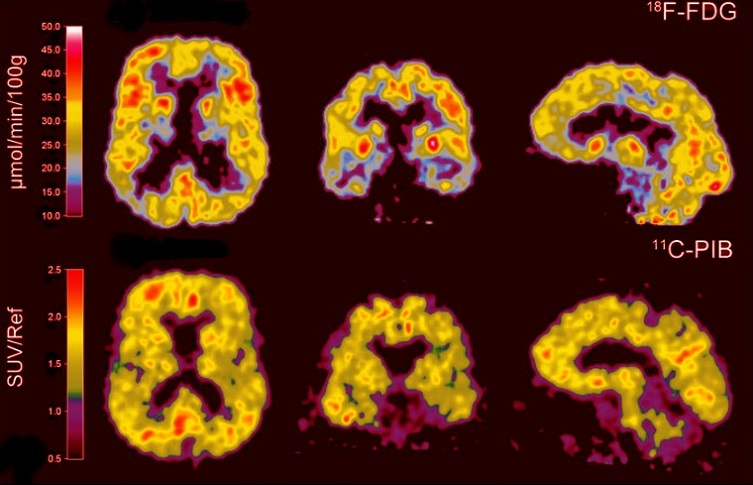Nikhil Prasad Fact checked by:Thailand Medical News Team Jan 26, 2025 3 months, 19 hours, 50 minutes ago
Medical News: The COVID-19 pandemic, caused by the SARS-CoV-2 virus, has significantly altered lives worldwide, reshaping societal norms and presenting major public health challenges. The virus was first identified in Wuhan, China, in late 2019, and within months, its rapid spread led to global lockdowns, mask mandates, and extensive healthcare system burdens. By April 2024, over 700 million cases and 7 million deaths had been reported globally. While fever, cough, and fatigue are among its common symptoms, COVID-19 has also shown a profound impact on various organ systems, including the nervous system.
 COVID-19 Alters Brain Glucose Metabolism
COVID-19 Alters Brain Glucose Metabolism
Neurological complications such as dizziness, headaches, altered consciousness, and seizures are now recognized as frequent manifestations of the disease.
Recent research has focused on understanding how COVID-19 affects brain function, particularly brain glucose metabolism, which provides insight into neuronal activity. This
Medical News report delves into a study conducted by researchers from the School of Medicine at Pusan National University, Yangsan, Republic of Korea, who analyzed the effects of COVID-19 on brain glucose metabolism through a detailed meta-analysis of existing 18F-fluorodeoxyglucose positron emission tomography (18F-FDG PET) studies.
Methods: Analyzing the Impact
The researchers conducted a systematic review of studies published in English from MEDLINE and EMBASE databases up to August 2024. They focused on publications that employed 18F-FDG PET scans to examine brain glucose metabolism in COVID-19 patients. These scans help measure neuronal activity by assessing glucose uptake in different brain regions. After an initial screening of 1,078 records, nine studies met the inclusion criteria for the meta-analysis. The researchers analyzed alterations in brain glucose metabolism, categorizing the findings into two main groups: increased (hypermetabolism) and decreased (hypometabolism) glucose activity.
Findings: A Complex Pattern of Changes
The meta-analysis revealed significant changes in brain glucose metabolism among COVID-19 patients. The findings were as follows:
-Hypermetabolism in Specific Regions
Two studies reported increased glucose metabolism in three brain regions: the left anterior cingulate gyrus, the right thalamus, and the brainstem. These areas play crucial roles in attention control, sensory and motor mechanisms, and vital functions such as respiration and cardiovascular regulation. Hypermetabolism in these regions may explain symptoms like fatigue, brain fog, and sensorimotor issues commonly reported in COVID-19 patients.
-Hypometabolism Varies by Age and Phase of Disease
Decreased glucose metabolism was more widespread and varied by age and the stage of the disease:
In Children: Hypometabolism was observed in the cerebellum, left amygdala/hippocampus, left anterior cingulate gyrus, and right amygdala. These areas are critical for mo
tor control, sensory processing, and emotional regulation, suggesting potential cognitive and motor impairments in children post-COVID.
In Adults: Hypometabolism was noted in the right temporal lobe, brainstem (during the acute phase), and the left occipital lobe and temporal lobes (in the chronic phase). These regions are linked to memory, cognition, and visual processing, potentially explaining the persistent brain fog and memory problems reported by many adults.
-Acute vs. Chronic Phases
The researchers categorized findings based on the time elapsed since diagnosis:
Acute Phase (within three months of infection): Hypometabolism was prominent in the right temporal lobe and brainstem. This phase often correlates with immediate neurological symptoms such as altered consciousness and seizures.
Chronic Phase (beyond three months): Hypometabolism extended to seven additional regions, including the posterior cingulate gyrus, precuneus, and right insula. These areas are associated with higher cognitive functions, suggesting that long-term neurological effects may persist even after recovery from the acute illness.
Implications of the Findings
The study highlights the multifaceted impact of COVID-19 on the brain. The observed changes in glucose metabolism underscore the virus's potential to disrupt neuronal activity and alter cognitive and emotional functions.
Hypermetabolism in the anterior cingulate gyrus and thalamus could result from inflammation or compensatory mechanisms, while hypometabolism in other areas suggests neuronal damage or reduced functionality.
Importantly, the findings also underscore the differences in how COVID-19 affects the brains of children versus adults, reflecting the interplay between age-related brain development and the disease's pathophysiology. The categorization of changes into acute and chronic phases further emphasizes the dynamic nature of COVID-19’s neurological impact.
Conclusion: A Call for Continued Research
The findings from this study reveal that COVID-19 significantly alters brain glucose metabolism, with both hypermetabolism and hypometabolism observed across different regions. These metabolic changes vary with age and the time elapsed since diagnosis, highlighting the need for age-specific and time-sensitive interventions.
The long-term neurological impact of COVID-19 remains a growing concern, particularly as the number of recovered patients continues to rise. Understanding these changes can guide the development of targeted therapies and rehabilitation programs. The study’s limitations, including the relatively small sample size and exclusion of studies using region-of-interest analysis, underscore the need for further research with larger cohorts and diverse methodologies.
In the face of such findings, it becomes imperative for the medical community to prioritize longitudinal studies that explore the long-term neurological consequences of COVID-19. Public health initiatives should also focus on providing resources for cognitive and emotional rehabilitation in post-COVID patients to improve their quality of life.
The study findings were published in the peer-reviewed journal: Brain Imaging and Behavior.
https://link.springer.com/article/10.1007/s11682-025-00966-2
For the latest COVID-19 News, keep on logging to Thailand
Medical News.
Read Also:
https://www.thailandmedical.news/news/oklahoma-study-involving-feline-model-shows-that-sars-cov-2-causes-alterations-of-whole-body-glucose-metabolism
https://www.thailandmedical.news/news/covid-19-research-longitudinal-analysis-of-pbmc-proteomics-reveals-metabolic-alterations-in-covid-19
https://www.thailandmedical.news/news/argentinian-researchers-warn-that-sars-cov-2-could-be-a-hepatotropic-virus-that-also-manipulates-glucose-metabolism
https://www.thailandmedical.news/news/covid-19-delirium-researchers-from-trinity-college-discover-that-delirium-in-most-covid-19-patients-linked-to-altered-glucose-metabolism-in-brain
https://www.thailandmedical.news/articles/coronavirus
